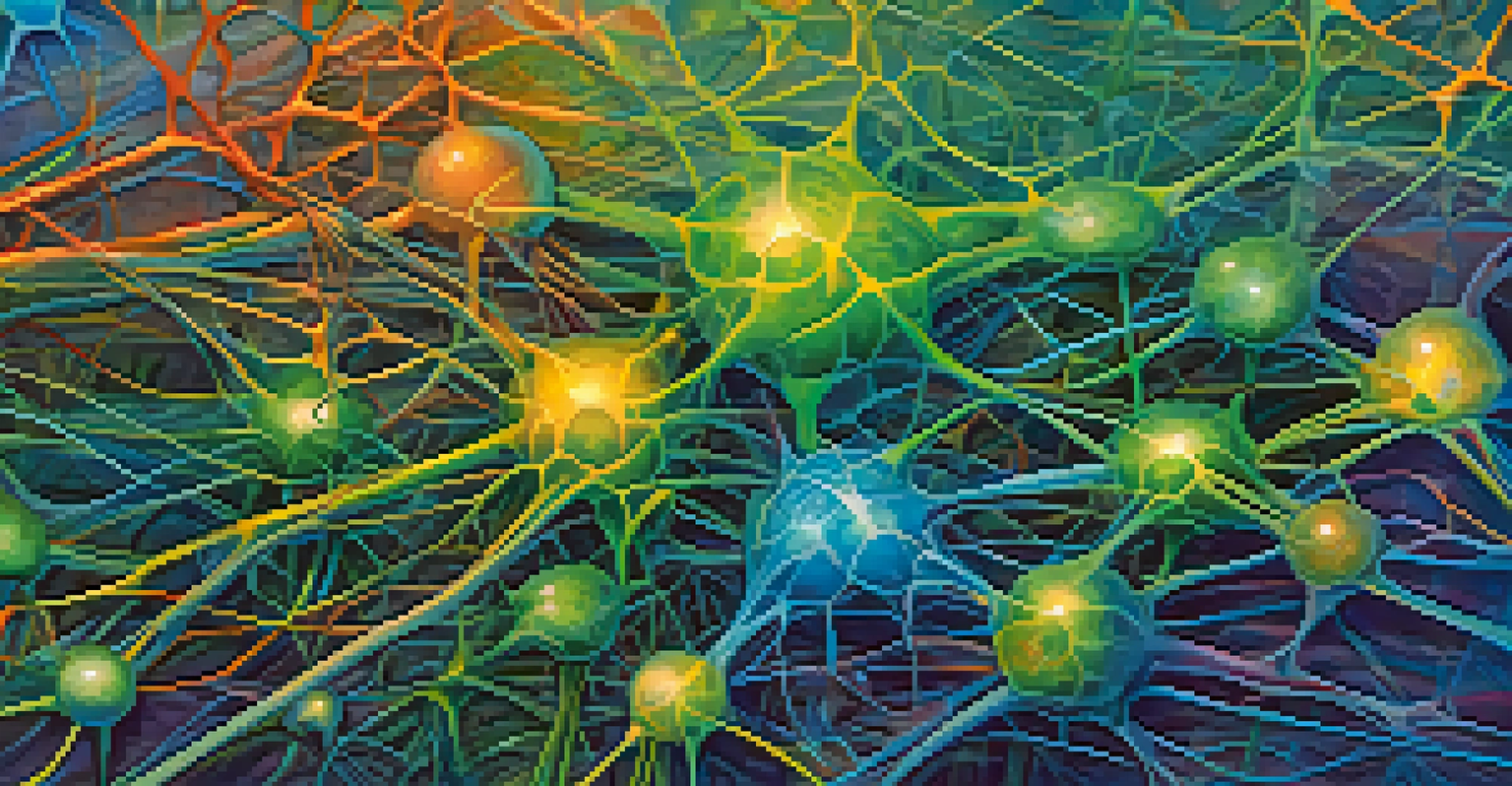Cannabis and Mental Health: A Comprehensive Review of Studies

Understanding Cannabis: An Overview of Its Components
Cannabis is a plant that contains various chemical compounds known as cannabinoids, the most famous being THC and CBD. THC (tetrahydrocannabinol) is responsible for the psychoactive effects, giving users a 'high,' while CBD (cannabidiol) is known for its potential therapeutic benefits without intoxication. This dual nature of cannabis makes it a topic of interest in mental health discussions, as different cannabinoids may influence mood and cognition differently.
The greatest wealth is health.
The interaction of these compounds with the human endocannabinoid system—responsible for regulating various physiological processes—suggests that cannabis could have significant implications for mental health. For instance, some studies indicate that CBD might help alleviate anxiety and depression symptoms, while THC could exacerbate them in certain individuals. Understanding these effects is crucial for both patients and healthcare providers when considering cannabis in mental health treatment.
Related Resource
As research continues to evolve, the challenge lies in separating anecdotal evidence from scientifically validated findings. Many users report positive effects of cannabis on their mental well-being, yet it remains essential to approach these claims with a critical eye, as individual experiences can vary widely.
The Positive Effects of Cannabis on Mental Health
A growing body of research suggests that cannabis, particularly CBD, may offer benefits for individuals suffering from anxiety and PTSD (post-traumatic stress disorder). For example, some studies indicate that CBD can help reduce anxiety during stressful situations, making it a potential alternative to traditional anxiolytics. Additionally, patients with PTSD have reported that cannabis use can help manage their symptoms, allowing for improved quality of life.

Moreover, some individuals with chronic pain or debilitating conditions have turned to cannabis to relieve their symptoms, leading to better mental health outcomes. The relief from physical discomfort can often translate to improved mood and decreased levels of depression. This connection highlights the importance of considering both physical and mental health when discussing cannabis use.
Cannabis Components and Effects
Cannabis contains cannabinoids like THC and CBD, which can have varying effects on mental health, with CBD potentially alleviating anxiety while THC may exacerbate it in some users.
However, it’s important to note that while many users report these positive effects, the scientific community is still investigating the extent and consistency of these benefits. Personal anecdotes are valuable, but they need to be supported by rigorous research to establish a clearer understanding of how cannabis can help.
Potential Risks and Negative Effects of Cannabis Use
While there are positive aspects to cannabis use, it’s crucial to acknowledge the potential risks, particularly concerning mental health. Studies indicate that high THC consumption may lead to increased anxiety, paranoia, and even psychosis in vulnerable individuals. This is especially true for those with a family history of mental health disorders, where the risk of adverse effects may be heightened.
The mind is everything. What you think you become.
Additionally, heavy cannabis use can lead to dependency issues, which may further complicate mental health conditions. Withdrawal symptoms, including irritability and mood swings, can emerge when regular users stop suddenly, potentially exacerbating underlying mental health issues. Thus, understanding the balance between benefits and risks is paramount for anyone considering cannabis as a treatment option.
Related Resource
This does not mean cannabis should be entirely dismissed; rather, it highlights the need for personalized approaches to treatment. What works for one person may not work for another, and being aware of potential drawbacks is essential for informed decision-making.
The Role of Dosage and Strain in Mental Health Effects
The impact of cannabis on mental health can vary significantly depending on the dosage and strain used. Low doses of THC may produce calming effects, while higher doses can lead to anxiety or paranoia. This variability underscores the importance of finding the right dosage for individual needs, which can be a complex process requiring careful experimentation and professional guidance.
Different strains of cannabis also have unique profiles of cannabinoids and terpenes, which can influence their effects on mood and cognition. For instance, sativa strains are often associated with uplifting and energizing effects, while indica strains are thought to provide more calming and sedative benefits. Understanding these distinctions can help users select the most appropriate strain for their mental health needs.
Balancing Benefits and Risks
While cannabis may offer therapeutic benefits, particularly for anxiety and PTSD, it's crucial to recognize the potential risks, such as increased anxiety or dependency, especially with high THC use.
Ultimately, this highlights the importance of a tailored approach to cannabis use. Working with healthcare providers who understand these nuances can lead to safer and more effective use of cannabis in managing mental health.
Current Research Trends in Cannabis and Mental Health
Research into cannabis and mental health is rapidly evolving, with scientists exploring various aspects of this complex relationship. Current studies are focusing on the long-term effects of cannabis use on mental health, particularly in adolescents and young adults, who may be more vulnerable to its effects. Understanding these dynamics is crucial as cannabis becomes more widely accepted and legalized.
Additionally, researchers are investigating the therapeutic potential of cannabinoids in treating various mental health disorders, such as anxiety, depression, and bipolar disorder. Clinical trials are underway to evaluate how different cannabinoid ratios can be optimized for specific conditions, paving the way for more informed treatment options.
Related Resource
As this field grows, it’s imperative to remain updated with the latest findings. Ongoing research not only helps to clarify the benefits and risks of cannabis use but also aids in developing guidelines that can assist healthcare professionals in making evidence-based recommendations.
Navigating Legal and Medical Considerations
As cannabis becomes increasingly legalized across different regions, understanding the legal implications is essential for anyone considering its use for mental health. Laws can vary widely, affecting everything from possession limits to medical prescriptions. For individuals seeking cannabis for therapeutic use, a clear understanding of local regulations is vital to ensure compliance and safety.
Moreover, seeking advice from healthcare professionals is crucial when considering cannabis as part of a mental health treatment plan. Medical professionals can offer insights into dosage, strains, and potential interactions with other medications, making them invaluable resources for those navigating this path. It’s important to approach cannabis use as a collaborative effort between patients and healthcare providers.
Importance of Dosage and Strain
The effects of cannabis on mental health are heavily influenced by the dosage and strain, necessitating a tailored approach for effective use in treatment.
With the right information and support, individuals can make informed decisions that align with their mental health goals while adhering to legal frameworks. This careful navigation can lead to a more effective and safe experience.
Conclusion: The Future of Cannabis and Mental Health Research
In conclusion, the relationship between cannabis and mental health is multifaceted and requires ongoing exploration. As more research emerges, we are likely to gain a clearer understanding of how cannabis can be effectively integrated into mental health treatments. The potential benefits, alongside the associated risks, highlight the need for a balanced approach that prioritizes individual needs.
Future research will play a crucial role in shaping policies and treatment protocols, ultimately providing patients with safer and more effective options. This evolving landscape calls for collaboration among researchers, healthcare providers, and patients to ensure that cannabis is used responsibly and effectively.

As we advance, fostering open discussions about cannabis and mental health will be vital in promoting awareness and understanding. By staying informed and engaged, we can better navigate this complex topic for improved mental health outcomes.